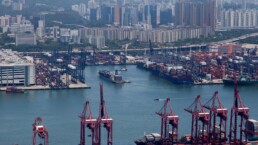In its General Assembly held in December 2018, the United Nations declared 24 January 2019 the first ever International Day of Education as a call to countries to commit to education as a force for inclusion and driving the achievement of the Sustainable Development Goals. As a result, education ministers gathered in London for the annual Education World Forum from January 20th to 23rd. Recently in Dubai, the Global Education and Skills Forum (GESF) hosted their annual conference and closed with its Teacher Prize event while Kenyan teacher, Peter Tabichi, emerged as the winner. This is a confidence booster for teachers across the continent who teach in some of the most adverse conditions. These gatherings and events offer a glimpse into what other countries are doing and offer an opportunity to learn and share notes on what works and doesn’t work amongst states, about ways of improving and providing quality education suitable to the African context And global trends and developments of where education is going; curriculum; Fourth Industrial Revolution (4IR) technologies; Artificial Intelligence; Personalized learning and coding to name a few. Taking into consideration that Africa is currently trailing most developing and emerging markets in educational outcomes and in meeting goal 4 of the SDGs, national governments need to both invest more in basic infrastructure such as water, sanitation, electricity as well as qualified teachers. We should worry about a new emerging inequality; the digital divide. If we don’t fix education quickly Africa might get left behind, The targeted 2030 might seem far but it’s only 11 years away we need all the help and collaboration to accelerate the provision of quality basic education for all. This article will use South Africa as a case study but will make reference to other countries and progress made by other Sub-Saharan Africa countries
The data
Globally today, 262 million children and youth still do not attend school; 617 million children and adolescents cannot read and do basic math; less than 40% of girls in sub-Saharan Africa complete lower secondary school and some four million children and youth refugees are out of school. According to the Facing Forward Schooling for Learning in Africa Report by the World Bank, an estimated 54.6 million African children of primary and lower secondary school age (averaging 24 percent of this age group) remained out of school in 2015, accounting for 45 percent of the global out-of-school population, and many of these children may never attend school. The three most populous Sub-Saharan African countries account for about 40 percent of children who are out of school: 10.5 million in Nigeria, 7.5 million in Ethiopia, and 3.2 million in the Democratic Republic of Congo.
The status quo
The public schooling system is riddled with challenges of governments working with limited resources and capacity as well as infrastructure backlogs including pit latrines, dilapidated buildings, teacher shortages, teachers leaving the profession, low academic standards, low numeracy and literacy, etc. Parents who are in the position to, are scraping together whatever resources they can to enrol their children in low cost private or high fee public schools. Parents should not take the blame for voting with their feet by enrolling their children in schools where they perceive quality is, as opposed to non fee payment. As a case in point, grade 12 learners in public schools in South Africa obtained a 34% bachelor pass rate (pass rate required to study a bachelors degree at university) and private schools 91%. Unfortunately, we are not as efficient as the likes of Finland in our public education where a child could just be enrolled in any school in their neighbourhood and the quality is the same across the system. There is the constant challenge of parents having to enrol their children in more expensive schools which are sometimes far from home in hopes of their children obtaining quality education
The quest for economic opportunities and quality education has seen the increase of migration of families into major cities like Johannesburg and Cape Town in South Africa thus putting pressure on existing infrastructure and increasing demand for new school infrastructure. These cities are leading in digitization, infrastructure, specialist schools of Engineering, Marine, etc. and hence, tend to produce better matric results. While the poorest provinces still struggle with the basics with some school still using pit latrines.
Pockets of Excellence and Progress
There is a lot of great work done by NGOs, governments and the private sector across the continent to close these gaps with pockets of excellence across the board. Rwanda has recently announced a private-public partnership project that will provide internet connectivity with a satellite to remote schools in disadvantaged communities in partnership with a UK based company. Vvob, an NGO, also offers professional development for teachers and school leaders in countries like Rwanda, Zambia, etc. Partners for Possibility in South Africa, a World Innovation Summit for Education (WISE) prize winner, connects business leaders to school principals to improve school leadership in disadvantaged schools, and Kagiso Trust, another NGO, assists schools with school development projects like building infrastructure and training teachers. Local and multinational corporates continue to fund ICT roll out, training and teacher professional development along with emerging low cost private schools such as Spark Schools.
However, a major challenge is that the benefits don’t always trickle down fast enough to those who need them most, which is, children in disadvantaged communities and additionally, interventions don’t scale far enough. Often, quality education is more accessible based on one’s area of residence. Those living in an urban or peri urban areas have greater access to quality education due to higher social status and better standard of living. Those living in townships, rural areas and villages get less quality education due to poor infrastructure and lack or shortage of well trained teachers.
In February 2018, Education International issued a statement to the African Union Heads of State calling for the privatization of education to be stopped and for governments to become guarantors and providers of quality public education. It cited as an example, low cost private school providers that did not live up to expectations. However, as pertains to the health sector, the government can’t possibly provide education on its own. The reality is that most public education systems lack capacity to provide basic education. As the Facing Forward Schooling For Learning in Africa report states, “managing even the basic functions of the system is a challenge. They (governments) must plan and manage the training, deployment, accountability, and payment of teachers; oversee the choice of location for new schools as well as the construction processes; supervise the procurement and timely delivery of textbooks and learning materials; and ensure the collection, analysis, and use of data on a regular basis.” The provision of quality education is a task that governments cannot do alone.
With a growing population that is estimated to be at 2.2 billion by 2050, it can be concluded from the above evidence that education systems in most African countries do not currently have the capacity to meet the demand that will accompany this increase. There is need to accelerate, replicate and scale interventions that are working in neighbouring states and vice versa.
Why Education?
Professor Adrian Saville from The Gordon Institute of Business (GIBS) makes use of his six factor model for economic development he argues that the ingredients for long term economic growth include; Education – particularly the first 1000 days of a child’s life and other things like stable policy environment with effective institutions.
As part of 18 economists from academia and industry that were invited by President Ramaphosa in a roundtable he convened on the topic “Strategies for long term prosperity: What would it take to place South Africa on a higher-growth trajectory?”, Dr Nic Spaull a Senior Research Fellow from Stellenbosch University makes the case for improving basic education as a solution to South Africa’s economic growth; Strategies for Long-term Prosperity.
This is corroborated by reports by The World Bank and the Organisation for Economic Co-operation and Development (OECD) which state that “the education system is really the binding constraint to long-term economic growth”
Possible solutions and ways forward
Education is everyone’s business as there are a lot of disparities and backlogs that will require collaboration for systemic improvement and long term gains both in terms of access and quality.
Proposed Model: Education (Government, NGOs and the Private Sector) for better coordination, use of data across interventions that is linked to quality and ultimately outcomes. Private-Public Partnerships and NGO’s. All these partners should take into consideration their strengths and weaknesses and work together for the benefit of children in Africa in an accelerated and equitable way.
The fear is that while the rest of the world, well resourced and “elite” schools in general are advancing in maths, literacy, personalized learning, coding and robotics, a large number of schools are trailing behind, still struggling with issues of literacy and numeracy, consistent power supply and a large number of out of school kids. Technological gadgets alone may not provide a systemic solution without equal focus on increasing basic literacy and numeracy rates and training of qualified teachers.
Additionally, governments should prioritize conducive learning and teaching environments, properly trained and supported teachers, while building partnerships with the private sector.
The UN has set the target of 2030 for the realization of Sustainable Development Goals the clock is ticking, we need to get education right quickly, and when we finally reach the 2030 deadline African states should start moving up in ranks in the top education systems of the world. Our development and competitiveness as a continent depends on it.
The views expressed in this article are those of the author alone and not the Future Africa Forum.
The views expressed in this article are those of the author and do not necessarily reflect the views of Future Africa Forum. Future Africa Forum is a pan-African policy think-tank and policy advisory consultancy headquartered in Nairobi, Kenya.



